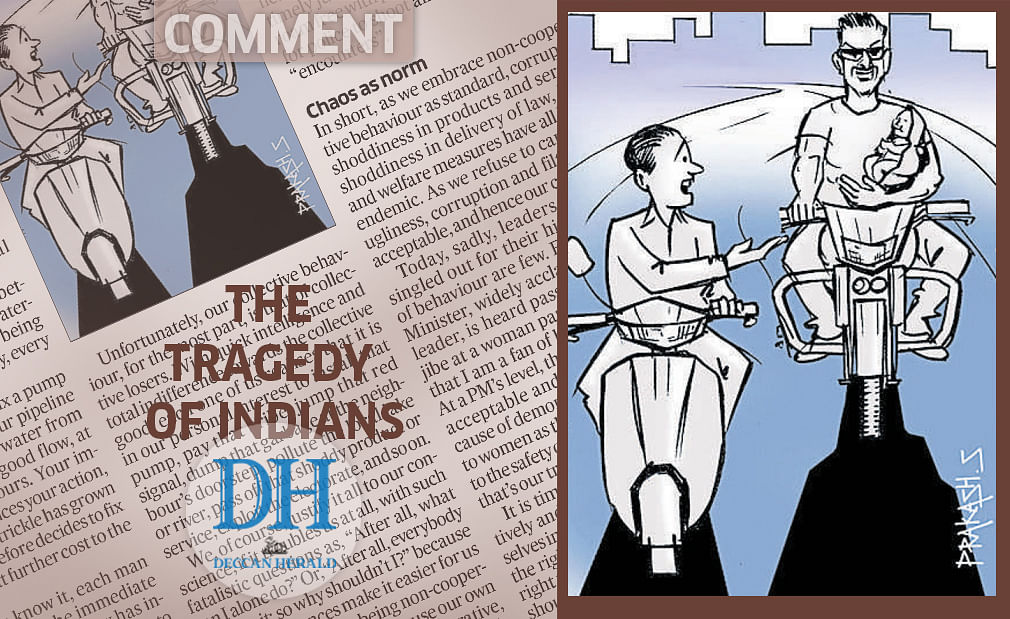On January 25, driving on one of our roads, I witnessed a man on a scooter mid-traffic driving with a nine-month-old baby in one arm. Horrified, I drove next to the man when the traffic momentarily halted, and gave him a piece of my mind for endangering the life of the child with his appallingly irresponsible behaviour. The man laughed at my needless agitation. Observing two constables a little ahead, I sped towards them and pointed out the scooterist with an urgent plea to stop the man forthwith. The constables grinned and just shrugged their shoulders, as the man drove on.
What have we come to as a society? Is everything par for the course? What are our standards of behaviour? Our ethics? Our morality? Our law enforcement? Are we on the verge of a total breakdown?
To understand these questions better, consider a city under severe water-crisis in summer, when water is being released only for two hours a day, every alternate day, in thin trickles.
Frustrated, you decide to fix a pump at a cost of Rs 10,000 on your pipeline so that it sucks in enough water from the system to give you a good flow, at the cost of your neighbours. Your immediate neighbour notices your action, especially as his water trickle has grown thinner still, and therefore decides to fix a pump of his own, at further cost to the other neighbours.
And before you know it, each man mimics the actions of the immediate neighbour until the entire city has installed a pump and the water is back to its original state of a thin trickle, with everybody poorer by Rs 10,000, even though everybody would have been better off if no citizen had fixed a pump ever.
One can readily see that what privately seems like a smart action can turn out to be a collectively dumb one. In fact, during hypothetical experiments, a much greater proportion of Indians students (as proxy for Indians in general) seem to opt for non-cooperative behavior, which is individually smart but collectively dumb, than students elsewhere in the world.
In a situation like the above, which mimics the tragedy of the commons, usually the best strategy is never to be the first one to violate the spirit of cooperation, and to punish any non-cooperator severely and proportionately. Such a strategy is usually found to be most effective in maximising the benefit for the community as a whole. In our water pump example, if nobody ever was the first one to install a pump, the benefit to the community as a whole is self-evident, and the promise of a swift punishment deters any potential non-cooperator.
Unfortunately, our collective behaviour, for the most part, is that of collective losers. With quick intelligence and total indifference towards the collective good, each one of us realises that it is in our personal interest to install that pump, pay that bribe, jump that red signal, dump that garbage at the neighbour's doorstep, pollute the local lake or river, pass off that shoddy product or service, exploit the electorate, and so on.
We, of course, justify it all to our conscience, if it troubles us at all, with such fatalistic questions as, "After all, what can I alone do?" Or, "After all, everybody is doing it; so why shouldn't I?" because such reassurances make it easier for us to go about our lives being non-cooperative all the time. And because our own behaviour is largely non-cooperative, we tolerate, or even accept as perfectly normal, similar non-cooperative behaviour in others.
So, we join the bandwagon of mass behaviour without introspection, and do not consider it important to punish wrong and non-cooperative conduct in others. At the individual level, the mute acceptance starts with our not even raising an eye-brow, leave alone socially tick off, the litter-bug, or the queue-jumper, or the unnecessary honker, or our cab-driver driving without seat-belt, or the loud talker on the cell-phone inside the confines of a bus, train or an aircraft.
And in course, it results in a constabulary that turns a blind eye to the scooterist driving with a baby in arms, the zig-zagging motorcyclist with three on the pillion, the red-light jumper, the over-loaded truck, the murdering marauder in the guise of a "cow protector", and the like.
Proceeding on this path, we have landed with an entire system of judiciary, parliament and bureaucracy of a nation that thinks it is all right for government schools not to deliver minimal quality education; for government hospitals not to deliver minimal quality healthcare; for judiciary not to deliver timely justice; for known criminals to roam free with political patronage, and for police to shoot alleged criminals in "encounters".
Chaos as norm
In short, as we embrace non-cooperative behaviour as standard, corruption, shoddiness in products and services, shoddiness in delivery of law, justice and welfare measures have all become endemic. As we refuse to care, chaos, ugliness, corruption and filth become acceptable, and hence our collective lot.
Today, sadly, leaders who can be singled out for their high standards of behaviour are few. Even the Prime Minister, widely acclaimed as a mass leader, is heard passing a pedestrian jibe at a woman parliamentarian (not that I am a fan of hers) in Parliament. At a PM's level, that behaviour is as unacceptable and as dangerous to the cause of demonstrating innate respect to women as the scooterist's action was to the safety of the child in his arms. And that's our tragedy.
It is time we looked inward, collectively and individually, and asked ourselves in whatever we do, "are we doing the right thing? How do we define the right thing?" In most cases, the answer should be simple. If everyone else did what I am about to do, would we be collectively better off? If the answer is yes, then what we are about to do is the right thing.
(The writer is an academic and author)
